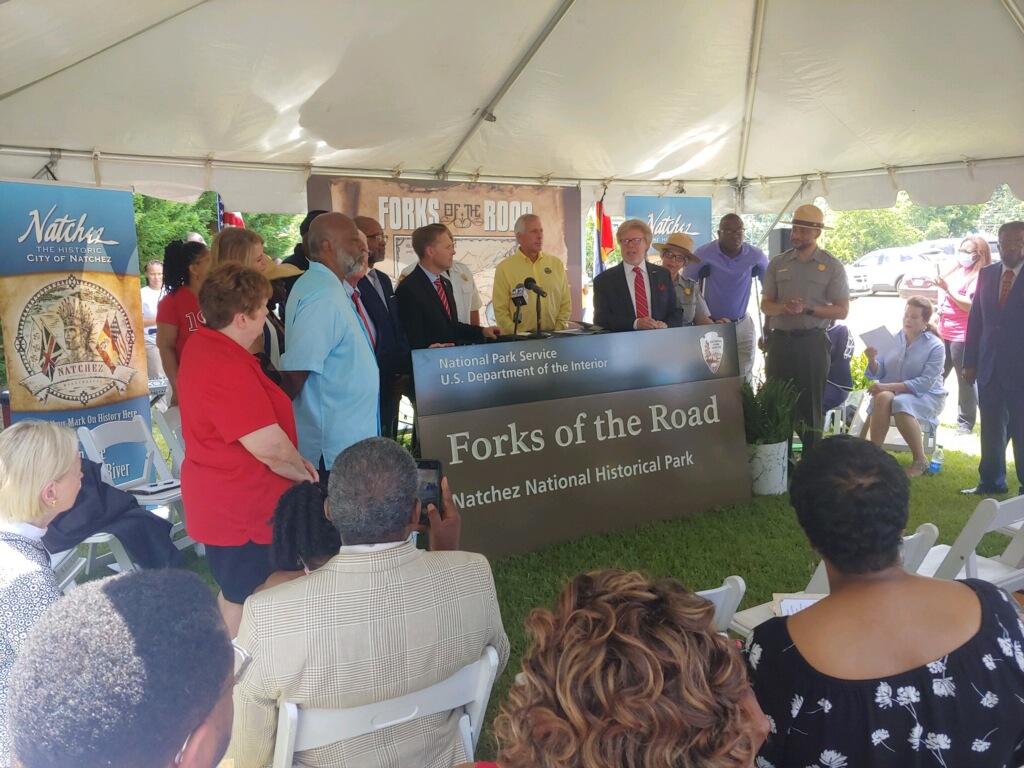News Release

NPS photo
|
Subscribe
|
Contact: Kathleen Bond, 601-431-8052
NATCHEZ, Miss – Today, the National Park Service (NPS) established the Forks of the Road site —one of the nation’s primary hubs for the trafficking of enslaved people before the Civil War — as the newest unit of Natchez National Historical Park with the acquisition of two key parcels donated by the City of Natchez. The land transfer became official during a Juneteenth ceremony hosted by the City of Natchez on June 18, coinciding with the inaugural Juneteenth federal holiday observance.
“This donation marks a significant step forward in acknowledging the travesties of enslavement and preserving the site’s stories for the education of this and future generations,” said Kathleen Bond, superintendent, Natchez National Historical Park. Natchez National Historical Park was established in 1988 as the first national park with a mandate to tell the stories of “[B]lacks, both slave and free.”
Bond continued, “Forks of the Road slave market reveals the horrors that thousands of enslaved people endured as the industry built on trafficking them as merchandise shaped the South and the nation’s historic development. The NPS is committed to telling the complete story of America’s history, because both the tragedies and triumphs help define our heritage and contribute to shared civic understanding. We will now be better positioned to help the world understand how this site, enslavement, and human trafficking in antebellum America impacted individuals, families, communities and our nation.”
Congress passed a law in 2017 authorizing establishment of Forks of the Road for preservation, commemoration and interpretation by Natchez National Historical Park within an 18.5-acre boundary. That law resulted from a 20-year effort by Ser Seshsh Ab Heter-CM Boxley of Natchez and the Friends of the Forks of the Road Society, Inc. who worked tirelessly to raise awareness and understanding about the site.
The City of Natchez owned and maintained nearly three acres of land at the Forks of the Road site prior to today’s donation of two parcels. The city plans to donate additional parcels in the coming months.
The land transfer was supported by the National Park Foundation, which provided financial and technical assistance to the Trust for Public Land for land acquisition. Working with the National Park Foundation, the Trust for Public Land and the Archeological Conservancy, the National Park Service will continue to acquire additional parcels of land from willing sellers within the site’s authorized boundary.
The NPS has initiated a Special History Study to inform the site’s interpretation and will invite public involvement in planning for the site.
About Forks of the Road
In the mid-19th century, Natchez, Mississippi was considered the epicenter of American capitalism and the institution of chattel slavery in America. The invention of the cotton gin, the availability of vast stretches of land recently vacated by the forced removal of the Chickasaw Indians, and the arrival of steamboats plying the Mississippi River centered Natchez as a hub for the creation of an economy based on cotton generated by the labor of enslaved people of African descent. Between 1832 and 1863, Natchez housed the second busiest slave trading market in the Deep South at Forks of the Road, the intersection of what is today Liberty Road and D'Evereux Drive, one mile east of downtown Natchez.
Prior to the establishment of the market at the Forks of the Road, slave trafficking was a common sight on almost every street corner in Natchez. In 1832, however, the fear of cholera forced the town council to order the slave traders outside the city limits. Over the next 30 years, tens of thousands of enslaved men, women and children were forced there by boat or foot, walking in long coffles from Virginia, Maryland, Kentucky and the Carolinas. People throughout the region visited Forks of the Road and recorded their impressions.
In 1864, formerly enslaved men who had joined the United States Colored Troops Union Army regiments in Natchez carried out orders to demolish the slave pens at Forks of the Road so the materials could be used in the construction of barracks inside Fort McPherson north of downtown Natchez. Some of those same men had endured torture and sale in that center.
Last updated: June 19, 2021
